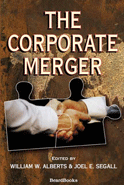|
|
|
|
||||||

|
The Corporate Merger This analytical and enlightening series of discussions on horizontal and conglomerate mergers were ahead of their time as the merger boom years of the 70s and 80s were just around the corner. Publisher Comments This book is the by-product of a seminar sponsored by the Graduate School of Business, University of Chicago. It consists of ten papers written by a distinguished group of scholars and businessmen investigating the corporate merger, the mechanisms for effecting it, and the managerial problems it presents. When the book was first published in 1966, it represented a significant contribution to scholarship in an important and developing area of business management. There was little existing managerial literature providing guidance in dealing with corporate mergers. There were certainly very few answers about the profitability of growth by merger. This book answers some of those questions. From the back cover blurb: Discussions focus on horizontal mergers and conglomerate mergers, with merger being defined as purchase of the assets of another firm, purchase of the outstanding shares of another firm, and statutory merger or consolidation with another firm. In order to narrow the focus, there is very little discussion of purely vertical mergers or those mergers made simply to gain access to the services or specific resources owned or employed by the acquired firm. No book reviews available.
No information on William W. Alberts available. Joel Edwin Segall, a former president of Baruch College and an economist, also who presided over Baruch from 1977 to 1990, and held positions at the University of Chicago and the federal departments of Labor and the Treasury. Born in Bridgeport, Segall served in the Army Air Force during World War II and earned master's and doctorate degrees at the University of Chicago. For 20 years, he taught at the University of Chicago Graduate School and became director of its doctoral programs. In the early 1970s, Segall served as deputy assistant secretary for tax policy in the Treasury Department and deputy undersecretary for international affairs in the Department of Labor. He was a consultant to the Securities and Exchange Commission when New York's Board of Higher Education picked him to preside over Baruch. He died in October 2003.
|
|||||||||||||||||||||||||||||||||||||||||||||||||||||||||||||||
|
|
|
home
| about
us | contact
us | related
sites |